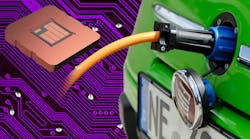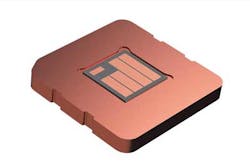Check out our coverage of PCIM 2023. This article is also part of the TechXchange: Silicon Carbide (SiC).
When silicon-carbide (SiC) semiconductors are used as switches, it improves overall system efficiency by enabling higher operating temperatures and switching frequencies. SiC power modules also can be tailored to different application needs and come in various topologies.
On that front, Infineon Technologies and Schweizer Electronic announced that they’re collaborating on a way to further increase the efficiency of chips based on SiC. They’re developing a solution to embed Infineon’s 1,200-V CoolSiC chips directly onto printed circuit boards (PCBs). The partners believe this initiative will lead to an increase in range capabilities for EVs and a reduction in total system cost.
The companies already demonstrated the potential of this approach with a 48-V MOSFET embedded in a PCB that boosted performance by 35%. They showcased this technology at PCIM Europe 2023 in Nuremberg.
The CoolSiC MOSFET 1200-V M1H is a silicon-carbide chip that will be implemented using the Infineon Easy module family. It will be housed in discrete packages using .XT interconnect technology, which is now also implemented in a TO-footprint.
Thermal dissipation is said to be enhanced by more than 30% compared to a standard interconnection. Such thermal benefit can be used to increase the output power up to 15%. The chip is well-suited for applications such as fast EV charging, energy-storage systems, and other applications.
Schweizer’s p2Pack
Schweizer contributed with its p²Pack solution, which enables power semiconductors to be embedded in PCBs. Applications developed with p² Pack technology allow for a compact design and a high level of integration. In addition, there’s potential for cost savings at the system level.
The fast-switching characteristics of the CoolSiC chips are optimally supported by the low-inductance interconnection that can be achieved with the p² Pack. This increases efficiency and improves reliability of power-conversion units such as traction inverters, dc-dc converters, and on-board chargers
The latest advances of CoolSiC technology enable a significantly larger gate operation window that improves the on-resistance for a given die size. The larger window also is said to provide high robustness against driver- and layout-related voltage peaks at the gate, without restrictions even at higher switching frequencies.
According to Infineon, CoolSiC MOSFETs can cut charging time in half while at the same trimming the charging station’s footprint. One 1,200-V SiC MOSFET is sufficient to support a dc-link voltage of 800 V.
Doubling the power density enables a 50% component count reduction versus a silicon solution thanks to doubled voltage. Its 50% lower conduction and switching losses from lower Coss (losses from charging and discharging the parasitic output capacitor) increases overall efficiency, thus lowering the cooling effort.
“Our joint goal is to take automotive power electronics to the next level,” said Robert Hermann, Product Line Head Automotive High-Voltage Discretes and Chips, Infineon. “The low-inductive environment of a PCB allows clean and fast switching. Combined with the leading performance of 1,200-V CoolSiC devices, chip embedding enables highly integrated and efficient inverters that reduce overall system costs.”
Check out more of our coverage of PCIM 2023, and more articles in the TechXchange: Silicon Carbide (SiC).

